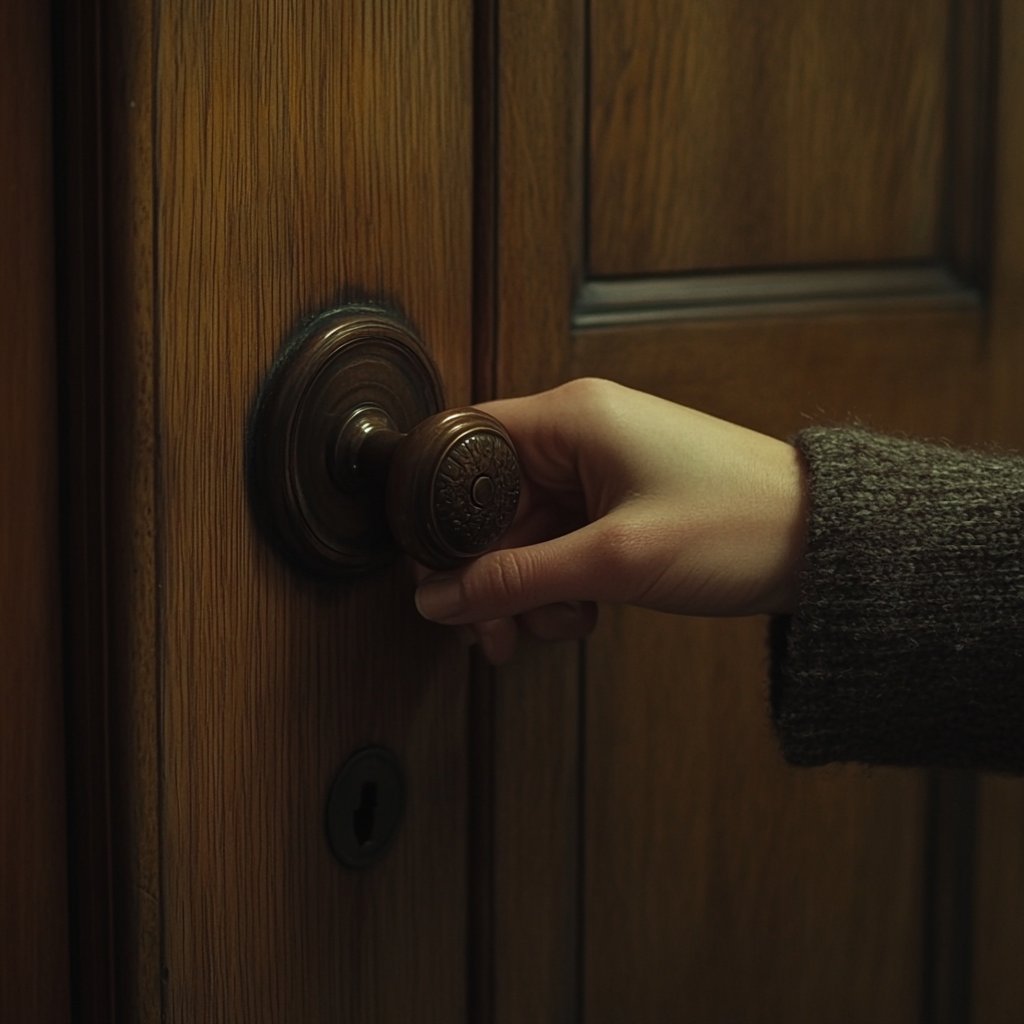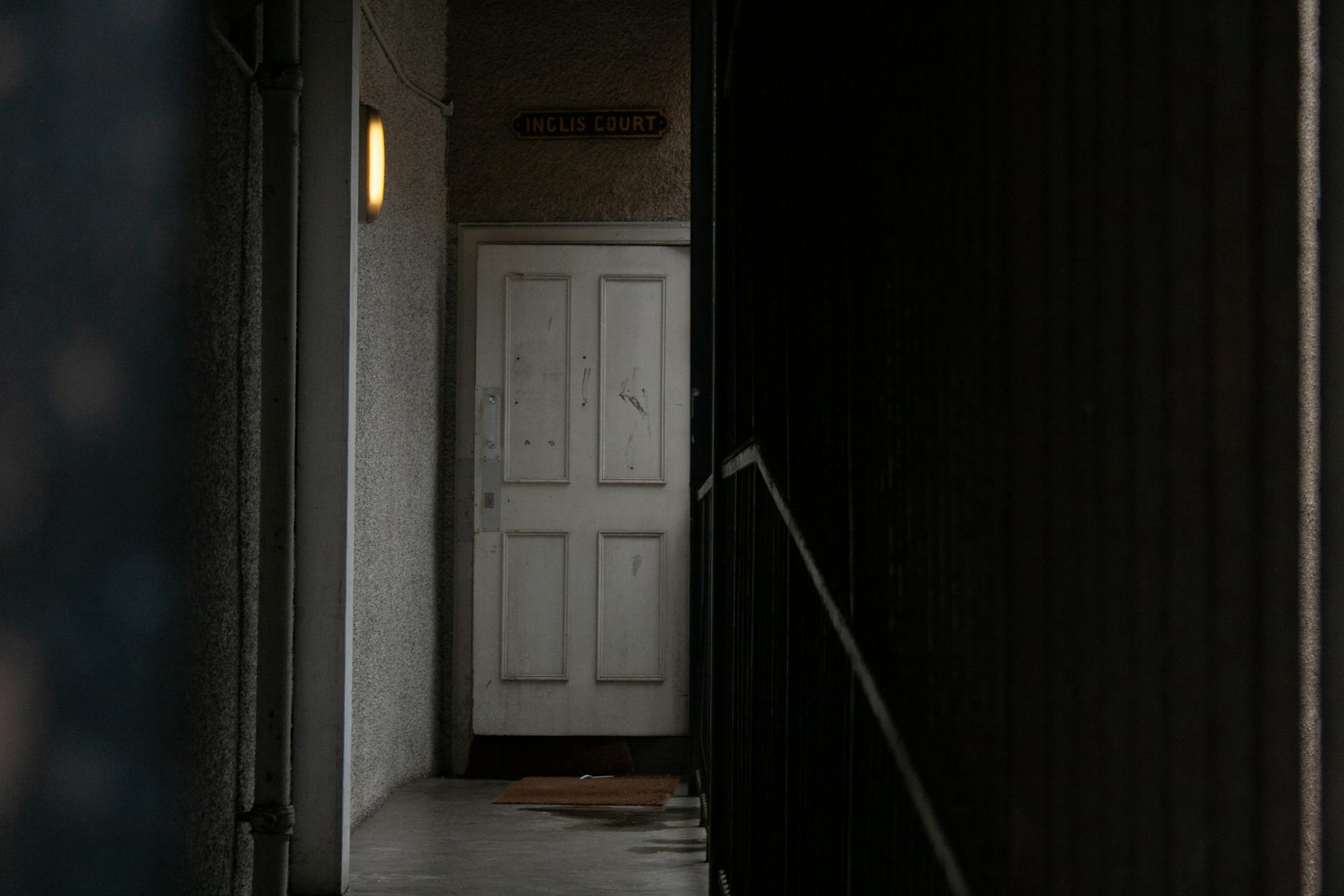Everyone has secrets. I just never thought my boyfriend’s was behind a locked door. “Just storage,” he said. But his dog knew better — always sniffing, whining, and begging me to look. And when the door finally cracked open one night, I realized Connor had been hiding something far bigger.
You ever feel like something is off but convince yourself it’s nothing? Like your gut is practically screaming at you, but your brain goes, ‘Nah, we’re good’? That was me with my boyfriend, Connor.
We’d been dating for four months, and on the surface, he was everything I wanted. Sweet. Funny. Thoughtful. The kind of guy who remembered my coffee order and sent good-morning texts. Oh, and he had a golden retriever named Max who acted like I was his long-lost soulmate.

A woman pampering a Golden Retriever | Source: Pexels
“You spoil him too much,” Connor would say, watching me scratch Max’s belly.
“Someone has to,” I’d reply, laughing as Max showered my face with kisses. “Besides, he’s the best judge of character I know.”
Connor’s apartment was just as charming — modern, spotless, and way too organized for a guy living alone. But there was ONE ODD thing that didn’t sit right.
A locked door.
At first, I brushed it off. Everyone has a junk room, right? A place where they shove old furniture, random boxes, and God knows what else.
When I asked, Connor just chuckled. “Just storage. A disaster I don’t feel like dealing with.”

A wooden door in a building | Source: Pexels
“Come on,” I’d teased one night, nudging his shoulder. “What’s really in there? Your secret superhero costume? A portal to Narnia? Dirty laundry?”
His laugh had seemed forced. “Trust me, it’s nothing exciting. Just… mess I haven’t dealt with yet.”
Seemed reasonable.
But every time I stayed over, Max would wander to that door, sniffing, pawing at it, and sometimes even whining. It was like HE KNEW something I DIDN’T. And maybe I should have trusted him.

Close-up shot of an alert dog sniffing something | Source: Unsplash
One evening, I needed something — a charger, I think. Connor was in the kitchen, humming as he cooked, the sound of sizzling pasta sauce filling the apartment. I wandered down the hallway, absently scratching Max behind the ears as he followed me.
The locked door loomed ahead, and I found myself walking toward it, figuring I’d check inside. What could be so bad about a messy storage room?
The second my fingers brushed the handle, a voice sliced through the air:
“DON’T TOUCH THAT!”

Close-up shot of a woman holding a doorknob | Source: Midjourney
I jumped, spinning around to see Connor storming toward me, spatula still in hand, his face dark with something I’d never seen before… something that made my blood run cold. My heart pounded as he snatched my wrist away from the door, his grip firm but not painful.
“I’m… I’m sorry,” I stammered, completely thrown off by his reaction. “I was just looking for —”
“It’s off-limits,” he snapped. Then, seeing my wide eyes and trembling hands, he exhaled sharply and ran a hand through his hair. His entire demeanor shifted like a switch had been flipped.
“I didn’t mean to yell,” he said, his voice softer now, almost pleading. “It’s just… a huge mess. I don’t like anyone going in there and seeing it.” He tried to laugh, but the sound was hollow. “Trust me, you don’t want to deal with that disaster.”

An anxious man | Source: Midjourney
Max whined softly beside us, his tail low, eyes darting between Connor and the door.
That should’ve been the moment I should’ve pressed for answers. The moment I noticed how Max’s behavior changed whenever we passed that door, or how Connor’s eyes would linger on it when he thought I wasn’t looking. But instead, I nodded, feeling awkward and embarrassed, and let the subject drop.
We went back to the kitchen, ate dinner, watched a movie, and pretended everything was normal.
But as I lay awake in his bed that night, I couldn’t shake the image of his face in that moment — the flash of panic and desperation. It was the first crack in his perfect facade, a glimpse of something deeper and darker. What is in that room? What is he hiding from me?
Then, last Friday, I stayed over, and the truth finally hit me… because of Max.

A distressed woman | Source: Midjourney
Connor was in the shower, and I was curled up on the couch, half-watching TV when Max started acting up. He wasn’t just sniffing at the door this time. He was whining and scratching, glancing between me and the handle like he was BEGGING me to do something.
“Dude,” I whispered, glancing toward the bathroom. “You’re gonna get me in trouble.”
Max let out a soft whimper, pressing his nose against my hand.
“What is it, boy?” I murmured, running my fingers through his fur. “What’s got you so worked up?”

A Golden Retriever standing in the hallway | Source: Pexels
But then I saw it.
The door wasn’t fully locked. The latch had slipped.
My heartbeat stumbled.
“This is a bad idea,” I whispered to myself, my fingers trembling. “A really, really bad idea.”
I should’ve left it alone. I should’ve just gone back to the couch. But my hand moved on its own, fingers curling around the knob.
Nervously, I pushed the door open.
And everything I thought I knew about Connor came CRASHING DOWN.
This wasn’t a storage room.
It was a BEDROOM.
And not just any bedroom — a fully furnished, lived-in, pink bedroom.

A pink bedroom | Source: Midjourney
I took a shaky step inside. The bed wasn’t made, a tiny pair of shoes sat by the closet, and a hairbrush with strands of dark brown hair rested on the dresser. A phone charger was plugged into the wall.
My fingers traced over a small desk, covered in multiplication worksheets and colorful markers. What I saw next made my breath catch completely.
A framed drawing on the nightstand. A stick figure labeled “Me” holding hands with a taller one labeled “Big Brother.” There was a sun, a dog, and a little house with a heart over it. The word “Brother” was erased and rewritten several times, as if the artist had wanted it to be perfect.
This wasn’t a guest room. Someone lived here. But who?

A framed photo of a stick figure drawing | Source: Midjourney
I barely had time to process before I heard the bathroom door open.
“HANNAH? What are you doing here?”
Connor’s voice pierced through the stillness around me.
I turned slowly, a hundred questions swirling in my head.
He stood there, towel slung over his shoulder, water dripping from his hair. The second he saw me in the room, his face drained of color.
He didn’t speak. Didn’t move.
I did. I crossed my arms and looked him in the eye. “Well… What’s going on here? Whose room is this?”

A nervous man | Source: Midjourney
Connor let out a slow breath, running a hand through his damp hair. “It’s not what it looks like.”
“Oh, great,” I said. “Because it LOOKS like someone LIVES here. So, by all means — explain.”
He hesitated. Too long.
“It’s just a spare room,” he said finally. “Friends stay over sometimes.”
I let out a sharp laugh. “Right. Because your “friends” need a pink bedroom, stuffed toys, tiny shoes, and a freaking hairbrush.”
“Hannah, please —” His voice cracked slightly. “I can explain everything.”
“Then do it!” I snapped, feeling tears prick at my eyes. “Because right now, my mind is going to some pretty dark places, Connor. What else haven’t you told me?”

A woman staring at someone | Source: Midjourney
His jaw tightened. “Hannah, just —”
“Who lives here?” My voice wobbled, but I held my ground. “Because someone clearly does. The homework on the desk, the drawings… this isn’t just some storage room you’ve been avoiding.”
He exhaled, dragging a hand down his face. I had never seen him like this before… his usual charm gone, and his confidence shattered.
My eyes flicked around the room again. The bookshelf full of fairy tales. The stuffed bunny tucked under the pillow.
My stomach twisted.”Connor… whose room is this?”
His gaze flickered to the drawing, then back to me.
He swallowed. “My sister’s.”
I stared at him. “Your SISTER??”

A sad little girl holding a stuffed bunny | Source: Midjourney
“God, I should have told you sooner,” he whispered, leaning against the doorframe. “I wanted to, Hannah. So many times.” He rubbed the back of his neck. “Lily. She’s seven.”
For a moment, I couldn’t speak.
“My mom had her late in life,” he revealed. “She didn’t… want to do it again. Said she was too old to be a mom all over again. I thought maybe she’d change her mind, but she never did.” His voice turned bitter. “By the time Lily was six, she was basically raising herself.”
“That’s terrible,” I breathed, looking at the carefully arranged stuffed animals on the bed. “How could anyone —”

Cropped shot of a pregnant woman | Source: Unsplash
“I’d come over and find her alone,” Connor said, his voice tight. “TV dinner in the microwave, struggling through homework by herself. Mom would be… gone. Sometimes for days. Our neighbor did what she could, but she wasn’t her parent.” He clenched his fists. “The final straw? I found her burning up with fever, climbing the counter to reach the medicine cabinet.”
Something ached in my chest. “So you took her in.”
Connor nodded. “I fought for custody. She’s mine now. Legally.” His eyes glistened. “Best decision I ever made.”
I let that sink in.
Connor had a kid. A sister he was raising. And he had never told me.

Grayscale shot of a man holding a child’s hand | Source: Pexels
I swallowed. “Why didn’t you say anything?”
He looked away. “Because I was scared. I really like you, Hannah. But not everyone wants to date a guy who comes with a seven-year-old kid.” His voice dropped. “I didn’t want to scare you off.”
“Did you really think so little of me?” I asked softly. “That I’d run at the first sign of responsibility?”
“It’s happened before,” he admitted, pain flashing across his face. “The last woman I dated… when she found out about Lily, she said she ‘wasn’t looking to be anyone’s mom.’ Didn’t even want to meet her.”
I let out a slow breath.
All the times he avoided talking about the room and the way Max would whine at the door… Connor wasn’t hiding something shady. He was protecting his family.

An emotional man smiling | Source: Midjourney
“She’s staying at a friend’s tonight,” he added. “Otherwise, you probably would’ve met her already. Usually, she’s out here the second I open my bedroom door.” He huffed a laugh, but his eyes were tired. “She’s… everything to me… after Dad passed last year.”
“Tell me about her,” I said gently. “What’s she like?”
His face softened immediately. “She’s… amazing. Smart as a whip, always asking questions. She loves art and science… she wants to be a ‘veterinarian-astronaut-artist’ when she grows up.” He smiled. “And she adores Max. They’re inseparable.”
I looked at him — really looked at him.
This wasn’t some guy leading a double life. This was a man who had stepped up for his little sister when no one else did. Who had chosen to be a father when no one asked him to. And he had been terrified I would run.

An emotional woman standing in a pink bedroom | Source: Midjourney
I took a deep breath, then reached for his hand. “I wish you’d told me sooner,” I said softly.
Connor’s head snapped up, eyes searching mine. “You… you’re NOT mad?”
“Mad that you’ve been raising your sister? That you stepped up when your mom couldn’t?” I shook my head. “No, Connor. I’m mad that you felt you had to hide it.”
His shoulders sagged, months of hidden weight lifting just a little.
“She’d like you,” he murmured. “She’s been asking about ‘Max’s friend’ for weeks now.”
“Max’s friend?” I laughed softly.
“Yeah,” he smiled. “She saw a picture of you on my phone and decided you belong to Max, not me.”
I smiled. “I’d like to meet her.”

A woman with a warm smile | Source: Midjourney
“Yeah?” His voice was hopeful. “She’s got a science fair next week. She’s been working on this project about plant growth…” He trailed off, uncertain. “If you wanted to come…”
“I’d love to,” I said firmly. “And Connor? No more locked doors between us, okay?”
“Promise!” he said with a chuckle, wrapping me in a tight hug.
For the first time since I opened that door, I saw something shift in his eyes.
Not fear. Not guilt.
Hope.
And as Max padded over, tail wagging, to rest his head on my lap, I realized something: sometimes the scariest doors hide the most beautiful truths.

A door in a house | Source: Pexels
Here’s another story: Two months after her husband’s death, Mercy still refused to accept that he was gone. She created an imaginary world of her own and assumed Carl was still alive. While neighbors thought she needed help, only one man understood her grief.
This work is inspired by real events and people, but it has been fictionalized for creative purposes. Names, characters, and details have been changed to protect privacy and enhance the narrative. Any resemblance to actual persons, living or dead, or actual events is purely coincidental and not intended by the author.
The author and publisher make no claims to the accuracy of events or the portrayal of characters and are not liable for any misinterpretation. This story is provided “as is,” and any opinions expressed are those of the characters and do not reflect the views of the author or publisher.



